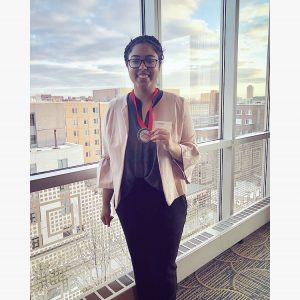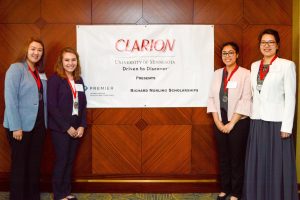

Uzma Khan, a first-year graduate student in the Division of Clinical Rehabilitation and Mental Health Counseling, received second place recognition alongside her team at the annual CLARION National Case Competition, a student-run program at the University of Minnesota dedicated to improving health care through interprofessional collaboration and leadership.
Khan, an international student from New Delhi, India, said she was the only student representing the field of clinical rehabilitation and mental health counseling across 17 interdisciplinary teams. Through the challenge, Khan said she learned insight into patient care.
“As a future health provider, it helped me practice health care based on an integrative biopsychosocial model, rather than only a social or medical model,” Khan said. “I learned about collaboration and approaching a problem from so many perspectives.”
Since 2005, students from across the nation have participated in an annual case competition that aims to achieve a holistic perspective on patient safety and health care improvements. Each year, students are presented with a case consisting of a complex problem that requires teams to perform a root cause analysis and develop an intervention that specifically addresses the presented problem.
This year, teams were tasked to address the rise of individuals experiencing homelessness in Hennepin County, Minnesota, and their resulting poor health outcomes.
The UNC-Chapel Hill team assessed county-level data along with case studies of individuals experiencing homelessness, and they identified that chronic, unmet health issues, met with a bottlenecked system for accessing resources, exacerbated many preventable and treatable conditions.
Khan and her team identified that the current system offers helpful resources; however, there was no coordination in connecting individuals experiencing homelessness with these resources to meet their specific needs. To address these needs, the UNC-CH team created an innovative, feasible, and sustainable solution, which they called the Labre Project.
The Labre Project proposes meeting individuals where they are. It streamlines resources with the implementation of two types of kiosks throughout the city of Minneapolis. The kiosk model meets two objectives: 1) connecting clients to nearby resources that best fit their most desired needs 2) reducing the bottleneck of health care services such as chronic care management, oral health screenings, and mental health services. The team proposed that both modalities of service be integrated among interprofessional teams by virtually connecting them into highly populated areas the homeless and the homed utilized. The kiosks serve as hubs of both passive and active interaction, enabling the most tailored and personalized form of meeting comprehensive health needs.
Each member of the UNC-CH interprofessional team represented a specific health care discipline. Natalie Browne is a first-year graduate student at the Gillings School of Global Public Health. Monica Kim is a third-year dental student at the Adams School of Dentistry. Christine Ko is a third-year student at the Eshelman School of Pharmacy. The team received a $5,000 team scholarship as recognition for their achievement.
The Division of Clinical Rehabilitation and Mental Health Counseling is ranked as the #9 program for rehabilitation counseling in the country, according to U.S. News & World Report. It is housed in the UNC School of Medicine Department of Allied Health Sciences.